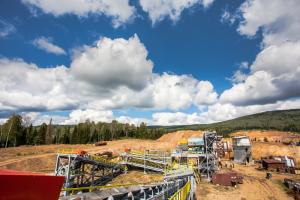
The European Commission has proposed a new legislation, the European Critical Raw Materials Act, to ensure a secure and sustainable supply of critical raw materials for the EU. The Act, on which the European Parliament and the European Council reached a provisional agreement on 13 November, stipulates the use of UNECE’s United Nations Framework Classification for Resources (UNFC), which will help provide reliable and comparable data on raw materials across different countries and commodities.
The Act’s regulatory text also confirms that the obligations under the UNECE Aarhus Convention on Access to Information, Public Participation in Decision-making and Access to Justice in Environmental Matters, and the Espoo Convention on Environmental Impact Assessment in a Transboundary Context, continue to apply in full. The Protocol on Strategic Environmental Assessment under the Espoo Convention can also support the integration of environmental and health considerations in countries’ plans. Given the Act’s relevance to increased mining processes and tailings facilities, the UNECE Convention on the Transboundary Effects of Industrial Accidents can help ensure safety. Global consultations under a United Nations Environment Assembly resolution on the environmental aspects of minerals and metals management have recognized the value for all UN Member States and operators of UNECE Safety Guidelines and Good Practices on Tailings Management Facilities and other tools developed under the Convention.
All four treaties are legally binding in the EU.
Role of UNFC for CRMs management
Discussions on UNFC and the United Nations Resource Management System (UNRMS), held on 16 November, during EU Raw Materials Week 2023 in Brussels, considered the benefits and challenges of implementing UNFC in the EU context as well as the opportunities for cooperation and harmonization with other regions and stakeholders
Critical raw materials (CRMs) are essential for the EU’s economy and transition to a green and digital future. They are vital for a range of sectors, including automotive, steel, aerospace, IT, health and renewable energy. However, the EU faces a high risk of supply disruptions due to its dependence on imports from a few countries and the low recycling rates of CRMs.
To address this challenge, the European Commission proposed a new legislation, the European Critical Raw Materials Act, to secure and diversify its sources of CRMs, both within and outside the EU. The Act aims to improve the circularity and sustainability of the value chain by promoting resource efficiency, recycling and substituting CRMs. It also recognizes the importance of UNFC to provide reliable and comparable data on raw materials across different countries and commodities. UNFC and UNRMS are developed by the UNECE Expert Group on Resource Management (EGRM). They are endorsed by the UN Economic and Social Council (ECOSOC) for global application and are being applied by a number of countries as well as regional bodies, including the African Union.
Co-organized by UNECE, DG GROW, EuroGeoSurveys, and the Horizon Europe projects FutuRaM and Geological Service for Europe (GSEU), the event highlighted UNFC’s role in providing a consistent and transparent framework for classifying and reporting energy, mineral, and other material resources.
Milan Grohol, Policy Officer at DG GROW, European Commission, highlighted the progress made by the EU in primary raw materials, mining waste, and end-of-life secondary raw materials management. He emphasised, “The EU CRMs Act is a comprehensive and ambitious legislation that will help the EU to secure its supply of CRMs, while respecting high environmental and social standards. UNFC is an important tool that can support the implementation of the Act and enhance the quality and comparability of the data on raw materials in the EU and beyond.”
Dario Liguti, Director of the Sustainable Energy Division at UNECE, underscored UNFC’s importance in ensuring supply chain security and sustainability. He noted, “UNFC and UNRMS are not only technical tools but also policy instruments that can help the EU and other regions to achieve their climate and development goals while ensuring a fair and equitable distribution of the benefits and costs of resource extraction and use.”
Karen Hanghoj, Director of the British Geological Survey and Chair of the UNECE Expert Group on Raw Materials (EGRM) elaborated on how UNFC aids in informed decision-making and investment in the raw materials sector, particularly when financing climate action in the lead-up to COP28 is high on the international agenda. She observed, “UNFC and UNRMS can provide a common language and understanding of the resource potential and the associated risks and opportunities. This can facilitate dialogue and collaboration among stakeholders, such as governments, industry, investors, civil society and academia, and foster trust and transparency in the resource sector.”
The event showcased successful case studies from France and Ukraine, demonstrating the practical application of UNFC in national contexts. Discussions also focused on technical advancements supporting the EU CRMs Act, emphasizing the need for continuous innovation in resource management.
The role of the International Centres of Excellence on Sustainable Resource Management in aiding EU Member States with the CRMs Act and UNFC was also discussed. The Centres, being established worldwide, aim to provide expertise and guidance for effectively implementing and utilising UNFC and UNRMS in different regions and contexts. They will provide training, capacity-building, knowledge sharing and best practices for the EU and other regions.